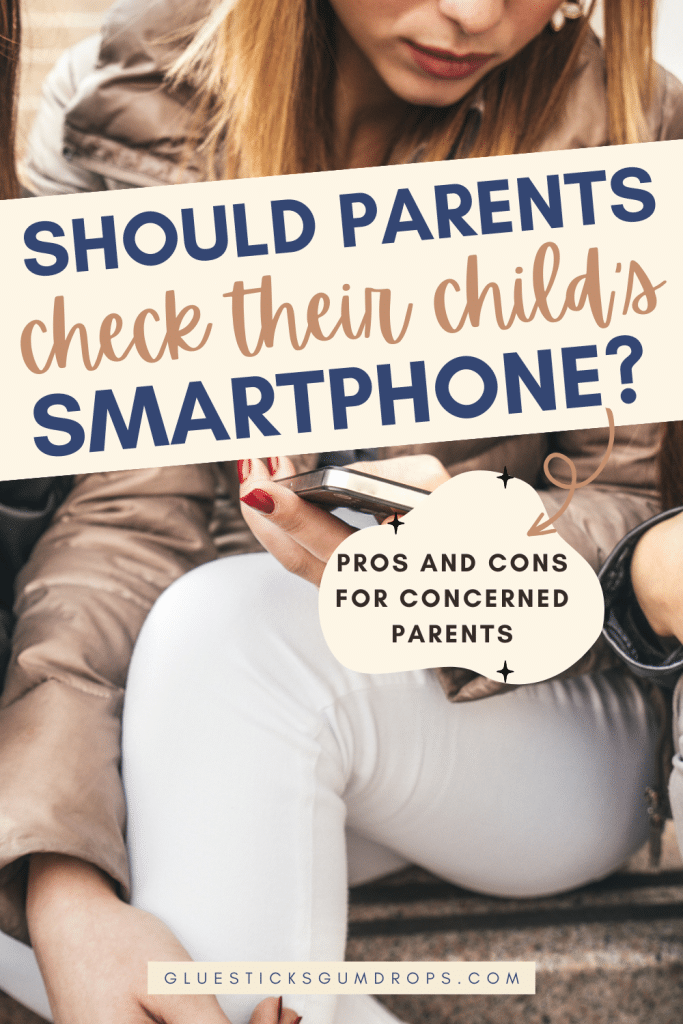Have you ever found yourself standing over your child’s phone, your finger hovering over the screen, trying to decide whether or not to take a peek? You’re not alone! It’s a modern-day parenting dilemma that has us all scratching our heads: To check or not to check—that is the question!
In today’s digital age, our kids are practically born with smartphones in their hands. While these gadgets can be lifesavers, they also open up a whole new world of concerns. Cyberbullying, online predators, and inappropriate content are just a few of the worries that keep us up at night.

So, what’s a concerned parent to do? On one hand, we want to protect our little (and not-so-little) ones from the dangers lurking behind those shiny screens. On the other hand, we also want to respect their privacy and foster a sense of trust. It’s like walking a tightrope, isn’t it?
Here, we’ll explore the pros and cons of checking your child’s phone and offer some balanced approaches that can work for your family. Whether you’re a tech-savvy parent or still figuring out how to use emojis, this post is for you! By the end, you’ll have a clearer idea of how to navigate this tricky terrain.
The Pros of Checking Your Child’s Phone
In this section, we’ll take a look at the reasons why you might want to consider checking your child’s phone. From ensuring their safety to keeping tabs on screen time, let’s explore the benefits of being a little extra vigilant.
1. Safety Concerns
When it comes to our kids, we’re like mama and papa bears, always on the lookout for potential dangers. And unfortunately, the digital world is filled with them.
First up, cyberbullying. It’s a term we wish didn’t exist, but unfortunately, it’s a reality for many kids today. By taking a peek at text messages, social media interactions, and even those seemingly innocent gaming chats, you can spot red flags. Are there any messages that make you cringe? Any conversations that seem a bit off? This is your chance to step in and address the issue before it escalates into something more serious.
Online predators are the wolves in digital sheep’s clothing. They’re savvy, they’re sneaky, and they know how to manipulate young minds. Monitoring who your child is chatting with can give you the upper hand in identifying these dangerous individuals. A simple check can help you ensure that your child is interacting with a safe circle.
And let’s not forget about inappropriate content. One wrong click can lead your child down a rabbit hole of content that’s not suitable for their age. By checking their browsing history or the photos they’ve saved, you can filter out the bad apples from the bunch.
Considering that, according to Pew Research, 20% of children under 12 have a smartphone, ensuring online safety is essential.

2. Monitoring Screen Time
Raise your hand if you’ve ever had to pry a phone out of your child’s hands at bedtime! Monitoring screen time isn’t just about making sure they get enough sleep (although that’s super important too!). It’s about understanding what they’re doing during those endless hours of scrolling.
Knowing which apps they’re glued to can offer valuable insights into their interests and even their social life. Are they obsessed with a particular game? Constantly scrolling through a social media platform? This information can help you guide them toward more balanced and healthy digital habits.
Monitoring screen time also gives you a golden opportunity to teach time management—a skill even some of us adults are still mastering! By understanding how much time your child spends on different activities, you can have meaningful conversations about priorities. Maybe it’s time to set some screen time limits or encourage other activities like outdoor play or reading.
3. Open Communication
Checking your child’s phone shouldn’t feel like a covert operation worthy of a spy movie. Nope, this is an opportunity for some good ol’ heart-to-heart conversations. Transparency is the name of the game here.
Before you even pick up that phone, have a chat with your child about why you’re doing it. Make it clear that this isn’t about snooping or invading their privacy, but rather about ensuring their safety and responsible usage. You might be surprised—many kids actually appreciate knowing the boundaries and expectations upfront. It’s like setting the rules of the road before handing over the car keys.
With mistakes come teachable moments. Let’s say you do find something concerning on their phone. Instead of going into full-blown “I told you so” mode, use this as a teaching opportunity. Discuss the implications of what you’ve found, whether it’s a risky text or an inappropriate image. Remember, the goal isn’t to catch them red-handed; it’s to educate and empower them to make better choices.

The Cons of Checking Your Child’s Phone
Checking your child’s phone may not go over well; there are some pitfalls to consider. From potential invasions of privacy to the risk of straining your parent-child relationship, let’s get into the nitty-gritty of why you might want to think twice.
1. Privacy Invasion
Imagine you’re a teenager again (oh, the nostalgia!). How would you feel if someone went through your diary without asking? A bit violated, right? Well, for many kids today, their phone is their digital diary. It’s where they share secrets, vent frustrations, and explore their evolving identities.
When we check our children’s phones without a clear understanding or agreement, it can feel like an invasion of their personal space. And let’s be honest, we all need our personal space, even kids. Privacy is a cornerstone of trust, and trust is what makes the parent-child relationship so special. If we’re always peeking over their shoulders, that trust can erode quickly.
But here’s the kicker: Invading their privacy can also backfire in unexpected ways. Kids are smart, and if they feel like they’re being monitored, they might just find more secretive ways to do what they want to do. Think hidden apps, burner accounts, or even a second phone. Yikes!
2. Strained Parent-Child Relationship
Imagine this: Your child finds out you’ve been checking their phone without their knowledge. How do you think they’d feel? Probably like they’ve been caught in a ‘trust trap,’ and nobody likes that feeling.
The truth is, a strained parent-child relationship can have long-lasting effects. It’s not just about the here and now; it’s about setting the tone for the future. If your child feels like they can’t trust you, what about other, potentially more serious issues down the line? We’re talking about those big life issues—relationships, career choices, and other monumental decisions. Trust is the foundation upon which all these conversations are built.
Of course, trust goes both ways. If your child is behaving in an untrustworthy manner, confiscating the phone until behavior improves is the logical thing to do.
3. False Sense of Security
Alright, let’s get into something that’s often overlooked: the illusion of safety. You might think that regularly checking your child’s phone is like having an all-access pass to their digital world, right? Well, not so fast! While it may give you some peace of mind, it’s important to remember that it’s not a foolproof method for ensuring their safety or well-being.
First off, kids are tech-savvy—like, really tech-savvy. They know the ins and outs of privacy settings, disappearing messages, and even apps designed to hide other apps. So even if you’re doing routine checks, you might only be scratching the surface of their digital lives.
Secondly, a false sense of security can lead to complacency. If you think that checking their phone is the be-all and end-all of online safety, you might neglect other important conversations about responsible internet use, such as when they’re gaming or using their laptops.
Lastly, a phone screen can’t show you what’s going on inside your child’s mind. Issues like stress, anxiety, or depression often require a more nuanced approach than simply monitoring text messages or social media activity. Open conversations and emotional check-ins are just as important for their safety.

A Balanced Approach
By now, you’ve seen that checking your child’s phone has its ups and downs. But don’t worry, we won’t leave you hanging! Here, we’ll look at some middle-ground strategies that can help you navigate the phone monitoring issue. From setting boundaries to keeping the lines of communication open, let’s find a balanced approach that works for you!
Tech Solutions
When it comes to managing your child’s phone usage, technology can actually be your best ally. There are a bunch of apps and features designed to help you keep tabs on your child’s digital activities without going full-on Big Brother. Use Appticles to research apps that can be helpful in various situations, such as monitoring Snapchat or location tracking.
First on the list, parental control apps. These are specialized apps that allow you to monitor and control various aspects of your child’s phone usage. From setting screen time limits to blocking inappropriate content, these apps are like your digital parenting sidekicks. Just remember, no app can replace open communication, so make sure you’re still having those heart-to-hearts with your kiddos.
Did you know that many smartphones come with built-in parental controls? For instance, both iPhones and Android devices have settings that allow you to restrict certain apps, enable content filters, and even track your child’s location.
Some apps and services provide summaries of your child’s activities, like weekly screen time reports or notification summaries. These can serve as great conversation starters and help you understand your child’s digital habits better.
Setting Boundaries
Setting clear boundaries for phone usage can help you and your child know what to expect, eliminating those “gotcha” moments that can lead to tension and mistrust.
Before your child even gets their hands on that shiny new phone, lay down some basic ground rules. When is phone usage allowed? Where should the phone be during family meals or bedtime? What kinds of apps are off-limits? Having these rules in place from the get-go sets the stage for responsible phone usage.
But hey, we’re all human, and rules are sometimes broken or bent. That’s where consequences come in. Make sure your child knows what will happen if they break the rules, such as losing their phone privileges for a day. Consequences reinforce responsible behavior.
Don’t forget to have frequent check-in points. These are pre-arranged times when you’ll review phone usage together. It could be once a week, bi-weekly, or even monthly. The key is to make it predictable and non-confrontational. Use this time to discuss any concerns, celebrate responsible usage, and adjust boundaries as needed.
By now, you should have a pretty good idea of the complexities involved in the decision to check—or not to check—your child’s phone. On the one hand, checking your child’s phone can offer valuable insights into their safety and digital habits. On the flip side, it’s crucial to remember that this approach comes with its own set of challenges, like potential invasions of privacy and the risk of straining your relationship with your child.
A balanced approach is the golden ticket. Setting clear boundaries, maintaining an open dialogue, and utilizing tech solutions can help you navigate these tricky waters. Remember, the goal isn’t to control every aspect of your child’s digital life but to equip them with the skills and knowledge they need to make smart choices.
